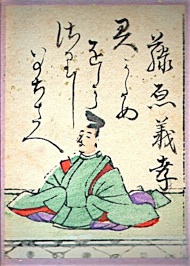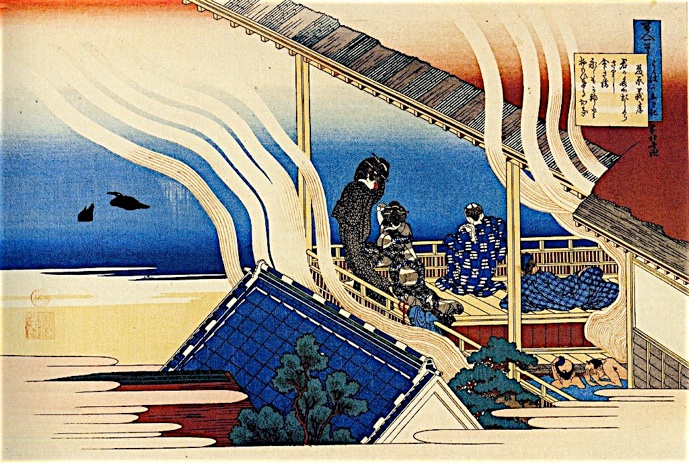藤原義孝

君がため
惜しからざりし
命さへ
長くもがなと
思ひけるかな
ふじわらのよしたか
きみがため
おしからざりし
いのちさえ
ながくもがなと
おもいけるかな
Fujiwara no Yoshitaka
For your precious sake
I’d even give up
My gossamer life,
So much do I wish
This may last long years.
Hokusai
Fujiwara no Yoshitaka (954 - 974), son of Koremasa (poem 45), died at age 21. He belongs to the Thirty-Six Immortal Poets and has several poems in the Goshuishu.
There are several ways to interpret this poem, based on why the poet valued his life so little. Maybe he would only gladly exchange the luxurious, vain life he led before, for a long life with his lover.
The woodcut shows men and women at a bath house. The steaming hot water could represent love, hot at first, later the quiet contentment sets in; or, love is compared to the immersion in a warm bath.
It looks like a night scene and the birds could be cormorants, trained and used in Japan as early as the 7th century for fishing at night. The happy experience of watching cormorant fishing is mentioned in the Kagero Nikki (written by Michitsuna no Haha, see poem 53), translated by Edward Seidensticker as The Gossamer Years. Maybe the bathers are either watching or fishing. Is not one of the women pulling a rope that holds one of the birds?
I have taken the liberty (consider it a tribute to Seidensticker) to translate inochi as ‘gossamer life’, referring to kagero, which means ‘summer haze’ or ‘ephemerality of human life’ - as the Kagero Nikki introduces itself with: ‘Call it, this journal of mine, a shimmering of the summer sky’.


